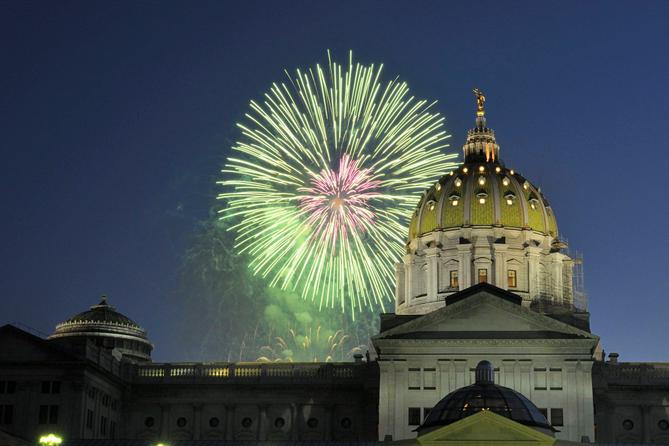Spotlight PA is an independent, nonpartisan newsroom powered by The Philadelphia Inquirer in partnership with PennLive/The Patriot-News, TribLIVE/Pittsburgh Tribune-Review, and WITF Public Media. Sign up for our free newsletters.
HARRISBURG — As Pennsylvanians stock up on Fourth of July fireworks, the state lawmakers who have sought to restrict or ban the use of recreational explosives aren’t making much headway in Harrisburg.
Since 2017, when Act 43 was passed by the General Assembly, Pennsylvanians have been able to legally purchase consumer fireworks that contain up to 50 mg of explosives for recreational use. Firecrackers, Roman candles, and bottle rockets can also be purchased in the state.
But since then, lawmakers have grappled with complaints over firework use. Last year, the commonwealth passed a follow-up law in response. It allows municipalities to limit firework explosions and only allow them from 10 a.m. to 10 p.m. There are exceptions for holidays like July 4 and the two days prior, when municipalities can limit fireworks after 1 a.m.
Despite the recent restrictions, some state legislators believe fireworks should again be banned altogether in the commonwealth.
State Rep. Tarah Probst, (D., Monroe) is one of those lawmakers, and she’s also the prime sponsor of a bill that would repeal the legalization of consumer-grade fireworks.
“The usage of fireworks has become a real nuisance in some areas, causing stress to pets and livestock, depriving people of sleep, and negatively impacting veterans and others with post-traumatic stress disorder,” Probst wrote in a memo to her colleagues.
However, Probst’s bill hasn’t caught on in the legislature. And state Sen. Frank Farry (R., Bucks) said he thinks he knows why.
Farry has been one of the legislature’s biggest supporters of local control over fireworks, and championed last year’s bill that allows municipalities to set firework curfews.
But a total ban, he said, is unrealistic. “You have businesses that have invested money, [and] now all of a sudden, something that was legalized in law, you are now going to make illegal,” Farry said.
“I will say, my bill that became law last session was a culmination of years and years of negotiations to try and see what we could do,” he continued, referencing Act 74 of 2022.
Farry, who also serves as a fire chief in Bucks County, said he understands that fireworks can be dangerous and disruptive, but he feels the investment by the fireworks industry in Pennsylvania, coupled with his bill’s added constraints and safety measures, is a reasonable compromise.
In addition to allowing time limits, Farry’s bill increased the penalties for repeated firework violations and gave individual municipalities more control over where residents can light them.
“Under the original law, there were no controls,” Farry said, adding that people in residential areas “could have technically been shooting them at 3 a.m., 365 days a year, which you probably wouldn’t appreciate. So we gave the municipalities greater control in terms of capping the times in which they can be shot.”
The bill also had a financial component.
Pennsylvania levies a 12% tax on fireworks on top of the commonwealth’s 6% sales tax. Prior to Farry’s bill becoming law, only 2% of that 12% tax went to emergency services and the remaining 10% went to the commonwealth’s general fund. The new law changed that, routing the remaining 10%, which generated between $10 and $14 million dollars annually, to first responders as well.
“Emergency services were only given about a sixth of that amount of money, which would have been about $2 million.” Farry said. “What we did is bring all that money back in to fund the first responders and the funding goes from workforce development for EMS to additional money in the fire grants that go to volunteer firefighters.”
That financial component mattered, Farry said, because it helped his bill get overwhelming support from firefighters, other first responders, and fellow public officials. Probst’s proposed bill has not seen the same level of support.
Her bill is not the first to attempt to roll back recreational firework use in Pennsylvania. When the commonwealth first legalized them in 2017, a movement to reverse the change quickly formed.
“I’d be happy to talk to [Probst] about it and explain to her the years of back and forth we had,” Farry said. “There was just never enough votes to actually make consumer fireworks illegal again.”
Ultimately, he said, consumer-grade fireworks appear to be here to stay.
Pennsylvania allows anyone over the age of 18 to purchase, possess, and use consumer fireworks, though ones containing more than 130 mg of explosives are reserved for professionals with a permit from the municipality where the display will take place.
With that reality has come an annual tradition of stern warnings from state safety officials.
Ahead of July 4, State Fire Commissioner Thomas Cook urged residents to use caution when using fireworks, especially during dry conditions. He noted that 99% of wildfires are caused by people.
“While we remind residents every year that fireworks are not toys, this year has the added risk of inadvertently setting off a wildfire due to lack of rain and dry conditions throughout the state,” Cook wrote in a news release. “The safest way to enjoy fireworks during Independence Day is to enjoy fireworks displays managed by professionals.”
Samuel O’Neal is an intern with the Pennsylvania Legislative Correspondents’ Association. Learn more about the program. Spotlight PA is funded by foundations and readers like you who are committed to accountability journalism that gets results.
